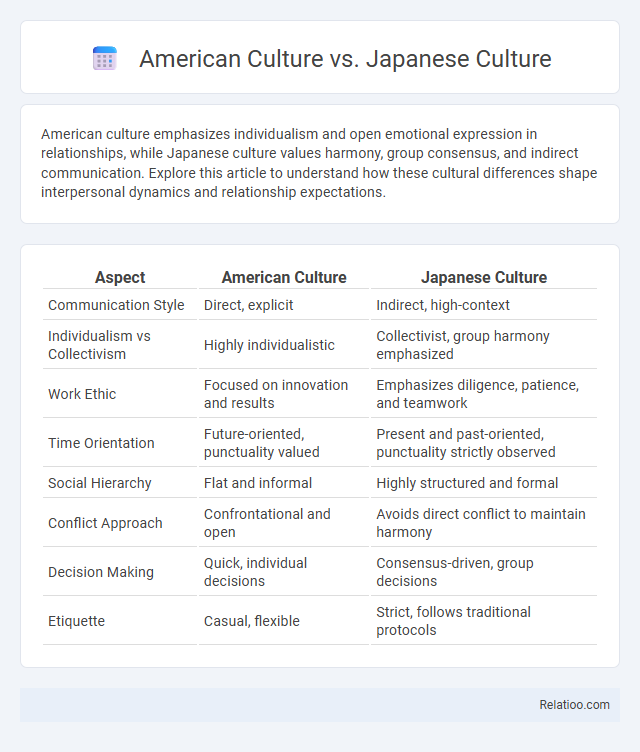American culture emphasizes individualism and open emotional expression in relationships, while Japanese culture values harmony, group consensus, and indirect communication. Explore this article to understand how these cultural differences shape interpersonal dynamics and relationship expectations.
Table of Comparison
| Aspect | American Culture | Japanese Culture |
|---|---|---|
| Communication Style | Direct, explicit | Indirect, high-context |
| Individualism vs Collectivism | Highly individualistic | Collectivist, group harmony emphasized |
| Work Ethic | Focused on innovation and results | Emphasizes diligence, patience, and teamwork |
| Time Orientation | Future-oriented, punctuality valued | Present and past-oriented, punctuality strictly observed |
| Social Hierarchy | Flat and informal | Highly structured and formal |
| Conflict Approach | Confrontational and open | Avoids direct conflict to maintain harmony |
| Decision Making | Quick, individual decisions | Consensus-driven, group decisions |
| Etiquette | Casual, flexible | Strict, follows traditional protocols |
Historical Foundations of American and Japanese Culture
American culture is historically rooted in Enlightenment ideals emphasizing individual rights, personal freedom, and democratic governance, shaped by colonial experiences and the frontier spirit. Japanese culture is grounded in Confucian principles prioritizing social harmony, hierarchical relationships, and collective responsibility, influenced by feudal traditions and Buddhist philosophy. These contrasting historical foundations foster American individualism centered on self-expression and autonomy, while Japanese culture emphasizes group cohesion and interdependence.
Core Values and Belief Systems
American culture emphasizes individualism, personal freedom, and self-expression, valuing innovation and independence as core principles. Japanese culture prioritizes collectivism, harmony, and social responsibility, placing great importance on group consensus and respect for tradition. Understanding these contrasting belief systems helps you navigate cultural interactions by appreciating Americans' focus on autonomy and the Japanese emphasis on community cohesion.
Social Etiquette and Communication Styles
American culture emphasizes direct communication and individual expression, valuing clarity and personal opinion in social interactions, which reflects its core principle of individualism. Japanese culture prioritizes harmony, indirect communication, and respect for hierarchy, with social etiquette deeply rooted in politeness and group consensus to maintain social order. The contrast highlights how American individualism fosters open dialogue and personal freedom, while Japanese cultural norms emphasize collective well-being and subtlety in communication.
Family Structure and Relationships
American culture emphasizes individualism, where personal independence and self-expression shape family relationships, often leading to nuclear family structures with less hierarchical dynamics. In contrast, Japanese culture prioritizes collectivism, with strong multigenerational family ties and a deep respect for hierarchy and social harmony within family roles. Understanding these cultural differences can help you navigate family expectations and relational norms effectively in both societies.
Education Philosophy and Practices
American culture emphasizes individualism in education, encouraging critical thinking, creativity, and personal expression, whereas Japanese culture values group harmony, discipline, and collective success within the classroom. Educational practices in the U.S. often promote student-centered learning and foster independence, while Japanese schools focus on uniformity, repetition, and respect for authority to maintain social cohesion. These differing philosophies reflect a broader cultural contrast between prioritizing personal achievement in America and communal responsibility in Japan.
Work Ethic and Professional Life
American culture emphasizes individualism, encouraging employees to express personal initiative and prioritize career advancement through innovation and self-promotion. Japanese culture values collectivism, where teamwork, harmony, and loyalty to the company are paramount, often resulting in long working hours and lifetime employment commitments. The contrasting work ethics reflect a balance between American emphasis on personal success and Japanese dedication to group cohesion and organizational stability.
Popular Entertainment and Leisure Activities
American culture emphasizes individualism through popular entertainment forms such as blockbuster movies, video games, and music festivals that celebrate personal expression and freedom. Japanese culture blends group harmony with leisure activities like karaoke, anime conventions, and traditional tea ceremonies, reflecting a balance between societal values and unique interests. Your appreciation of these cultural differences enhances understanding of how entertainment and leisure shape identity and social interaction globally.
Cuisine and Dining Customs
American culture emphasizes diverse, large-portion cuisines often enjoyed in casual, fast-paced dining settings reflecting individual preferences and convenience. Japanese culture values seasonality, presentation, and communal dining rituals, highlighting respect, harmony, and mindfulness in meals. Individualism in America promotes customization and personal choice in food, while Japanese dining customs prioritize group consensus, etiquette, and shared experiences.
Approaches to Tradition and Modernity
American culture emphasizes individualism through innovation and the continuous reinterpretation of tradition to fit modern values, often prioritizing personal freedom over collective customs. Japanese culture balances deep respect for centuries-old traditions with selective modernization, integrating technological advancements while preserving social harmony and cultural rituals. Approaches to tradition and modernity in these cultures reflect broader values: American individualism drives dynamic change, whereas Japanese collectivism fosters continuity and adaptive preservation.
Perceptions of Individualism vs. Collectivism
American culture emphasizes individualism, valuing personal freedom, self-expression, and independence as key components of identity. Japanese culture prioritizes collectivism, highlighting harmony, group loyalty, and social responsibility within family, workplace, and community settings. These cultural perceptions influence social behavior, communication styles, and decision-making, with Americans often seeking autonomy while Japanese individuals tend to prioritize group consensus.

Infographic: American Culture vs Japanese Culture
 relatioo.com
relatioo.com